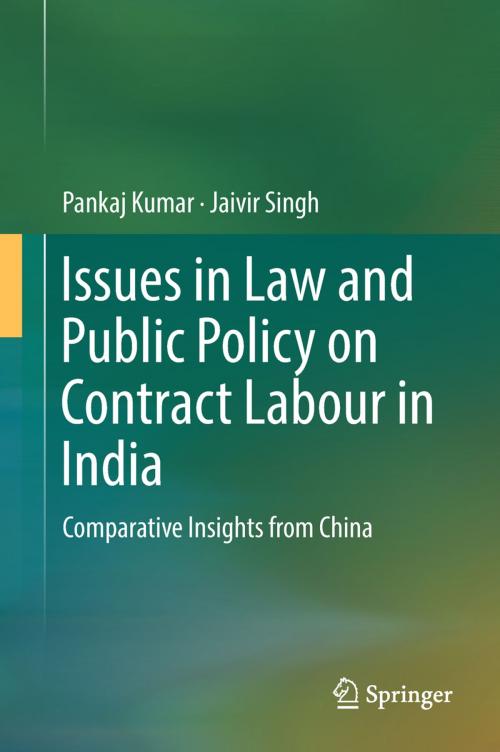Issues in Law and Public Policy on Contract Labour in India
Comparative Insights from China
Nonfiction, Reference & Language, Law, Labour & Employment, Social & Cultural Studies, Political Science, Government, Public Policy| Author: | Pankaj Kumar, Jaivir Singh | ISBN: | 9789811084447 |
| Publisher: | Springer Singapore | Publication: | September 14, 2018 |
| Imprint: | Springer | Language: | English |
| Author: | Pankaj Kumar, Jaivir Singh |
| ISBN: | 9789811084447 |
| Publisher: | Springer Singapore |
| Publication: | September 14, 2018 |
| Imprint: | Springer |
| Language: | English |
This book discusses the increasing use of contract labour in India that has accompanied attempts to liberalise the economy. After briefly examining Indian labour laws and public policy, it juxtaposes the country’s labour market practices with international labour standards. The questions that are raised are then explored through a series of empirical studies investigating the use of contract labour in a variety of industries and locations, manifesting a wide-spectrum of concerns including labour standards, productivity and employment relations. The set of comparative research studies within India are supplemented with a field study from the Shenzhen and Guangzhou industrial regions of South China, which are in an advanced stage of industrial development.
The unprecedented inflow of capital into China has captivated many developing countries, including India, which has gone on to mimic similar strategies particularly in terms of labour market deregulation. In this context, a set of crucial questions arise – can enforcing ‘labour market flexibility’ in itself provide the required impetus for a nation’s industrial growth? Is the Chinese success in becoming the major destination for foreign direct investments (FDIs) a consequence of a flexible labour regime or is there some other concealed strength to be found in Chinese labour market institutions? In particular it needs to be noted that after double-digit growth for more than 25 consecutive years, China has recognised some of the fallacy of its development path and in 2008 adopted fairly stringent labour laws, which now regulate its labour market.
This Chinese trajectory perhaps has lessons for India and other countries that are still struggling on the liberal path. In particular, the Chinese example helps put the Indian field studies in perspective and provides insights into India-specific policy recommendations that could also be useful for the developing world. The book concludes with the observation that where production entails long-term relationships, the interests of both the employer and the workers need to be maintained sustainably. As the title suggests, the book provides takeaways, not only for academics and researchers working in this field but also for lawyers, consultants, politicians, bureaucrats, and policymakers.
This book discusses the increasing use of contract labour in India that has accompanied attempts to liberalise the economy. After briefly examining Indian labour laws and public policy, it juxtaposes the country’s labour market practices with international labour standards. The questions that are raised are then explored through a series of empirical studies investigating the use of contract labour in a variety of industries and locations, manifesting a wide-spectrum of concerns including labour standards, productivity and employment relations. The set of comparative research studies within India are supplemented with a field study from the Shenzhen and Guangzhou industrial regions of South China, which are in an advanced stage of industrial development.
The unprecedented inflow of capital into China has captivated many developing countries, including India, which has gone on to mimic similar strategies particularly in terms of labour market deregulation. In this context, a set of crucial questions arise – can enforcing ‘labour market flexibility’ in itself provide the required impetus for a nation’s industrial growth? Is the Chinese success in becoming the major destination for foreign direct investments (FDIs) a consequence of a flexible labour regime or is there some other concealed strength to be found in Chinese labour market institutions? In particular it needs to be noted that after double-digit growth for more than 25 consecutive years, China has recognised some of the fallacy of its development path and in 2008 adopted fairly stringent labour laws, which now regulate its labour market.
This Chinese trajectory perhaps has lessons for India and other countries that are still struggling on the liberal path. In particular, the Chinese example helps put the Indian field studies in perspective and provides insights into India-specific policy recommendations that could also be useful for the developing world. The book concludes with the observation that where production entails long-term relationships, the interests of both the employer and the workers need to be maintained sustainably. As the title suggests, the book provides takeaways, not only for academics and researchers working in this field but also for lawyers, consultants, politicians, bureaucrats, and policymakers.















